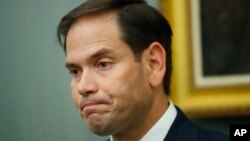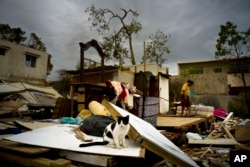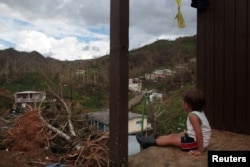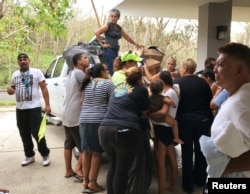Senator Marco Rubio said on Thursday he has urged U.S. President Donald Trump to create a high-level task force to provide ideas and advice for helping Puerto Rico to rebuild after Hurricane Maria, and that the president was receptive to the idea.
Rubio, a Republican from Florida who has been deeply involved in discussions over the response, told Reuters that the task force could be a sounding board for Trump "as we move beyond the initial recovery phase to the broader long-term recovery phase."
Hurricane Maria slammed into Puerto Rico three weeks ago, killing at least 43 people and leaving much of the Caribbean island, a U.S. territory, without electricity or safe drinking water. Disaster costs are expected to run into the tens of billions of dollars.
Prior to the hurricane, Puerto Rico was already struggling with $72 billion in debt, a flight of residents to the U.S. mainland and aging infrastructure, including a decrepit power grid that was incapacitated by the storm.
Rubio said he suggested forming an advisory group during a conversation with Trump on Sunday. "He was asking me, 'What do we need to do next?'" Rubio told Reuters.
"My argument to him was, I have some ideas, but there are people who have even more, better ones, because they live or lived in Puerto Rico, they understand its politics, its economics, its pre-existing challenges and its long-term opportunities," he said.
"He seemed to like the idea, and said they would follow up and see what that would look like," Rubio said.
The White House did not respond to a request for comment on the discussions.
Trump came under fire on Thursday for a series of tweets about the island's economic problems. He said federal responders could not stay in the territory "forever."
Rubio said federal responders would likely be on the island longer than during a "conventional" disaster on the mainland but agreed they would not be there forever.
"I'm not sure the timing is ideal given the fact that they're in the midst of this challenge that continues to evolve," he said.
What's the Alternative?
Rubio, who visited Puerto Rico on Sept. 25 to survey hurricane damage, said he was confident the island would get the help it needs in the short term through emergency legislation.
"The bigger concern is in the long term," he told Reuters in a 30-minute telephone interview as the House of Representatives moved ahead with a $4.9 billion loan for Puerto Rico as well as billions more in disaster relief.
The House easily passed the bill, with the Senate expected to do so later this month and send it to Trump for signing into law.
Puerto Rico's economy ground to a halt in the storm. Its government is poised to run out of money for payroll and essential services at the end of October.
That left Congress with little choice but to help fill the gap, Rubio said.
"Businesses aren't functioning, taxpayers aren't generating any sort of revenue or income to be paid to their coffers, so yeah, I think there's a big question about whether that's a loan that will ever be repaid. But what's the alternative?" he said.
Puerto Rico's governor, Ricardo Rossello, also has asked for $4.6 billion in block grants and other types of funding.
The White House is looking at how to address the long-term needs, including how to rebuild the power grid. The lack of electricity has been the biggest problem for Puerto Rico's 3.4 million residents.
"They're basically three weeks now living in the 19th century," Rubio said. Puerto Ricans, who are U.S. citizens, are likely to continue to flee to the mainland United States unless conditions improve, with Florida one of their top destinations.
Mountains of Debt; Medicaid Cliff
Rubio said it is up to the oversight board charged with resolving Puerto Rico's debt crisis to determine how to address the island's debt, noting that private debt owed to investors with legal recourse cannot simply be "forgiven" by the federal government.
"I don't think there's going to be a federal bailout in which billions of dollars are spent to bail out Puerto Rico.
Quite frankly I've never had anyone in Puerto Rico's government ask for that," Rubio said.
The island is also running out of money for Medicaid, the U.S. health insurance program for the poor, which about half its residents counted on even before the storm threw many people out of work.
The exodus to the mainland could accelerate unless the perennial funding gap is addressed, Rubio said. In the meantime, he said he thinks Congress will find money to help Puerto Rico avert the cliff.
On healthcare and many other structural issues, the hurricane could be the turning point "for better, or for worse," Rubio said.
The nation could "rally" to focus on Puerto Rico's long-neglected economic problems.
"Or it could be one of those moments when you have this horrible storm and it took so long that things never really got better, and a lot of people left and never came back," he said.








